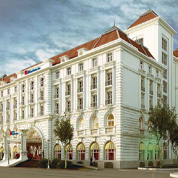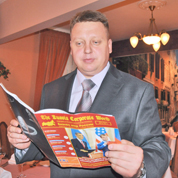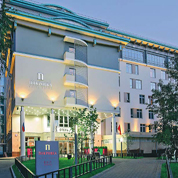The Russian hotel industry braces for the post-crisis era

The resultant negative impacts for the industry were marked declines in the volume of tourist traffics and MICE-events, the two key groups of clients that traditionally consume the lion’s share of all hotel services, and hence the unprecedented fall in demand for all types of hospitality services in the industry.
Russia’s resurgent hospitality industry poises for post-crisis market activities
Though the market situation today is a lot better in 2009, all experts contacted by TRCW have, however, conceded that it will take ‘some significant time span’ for the post-crisis market to return to its previous robust, pre-crisis level. Thus, commenting on today’s prevailing industry trends, Milan Hotel General Manager Svetlana Shekhvatova, noted that though the market in 2010 has yet to fully return to its pre-crisis growth trajectory, a steady, but gradual growth, compared to 2009, has been evident in the industry since the beginning of the year.
Another vital observation is the crisis’ so-called ‘sanitary effect’ on the industry, as it effectively drove out ‘opportunists and speculative investors’ from the market, leaving behind real professional players that are fully committed to the industry. This view is shared by Golden Apple Hotel General Manager Maxim Golovatch, who had called the economic crisis a form of ‘a professionalism test’ for the industry players. “Indeed, there was no crisis as such in the hotel industry, as the sector still grew, but only at a much slower pace caused by some market difficulties. However, these difficulties were not catastrophic for the hotel industry.”
 Milan Hotel General Manager Svetlana Shekhvatova: “We plan to increase our market share, undertake further development of our brand and boost its competitiveness.”
Milan Hotel General Manager Svetlana Shekhvatova: “We plan to increase our market share, undertake further development of our brand and boost its competitiveness.”
However, offering a different view, Igor Nesterenkov, CEO of Maxima Hotels chain, acknowledged the negative impacts of the crisis, saying the resultant tensed situation on the market had forced industry players to be more ‘flexible’ in their management policies. “It was no secret that prices for hotel accommodation fell by 20%, while the depth of booking was practically reduced to a week at the peak of the crisis. In such conditions, it became very difficult to forecast seasonal occupancy ...”.
Most hotel CEOs contacted for this report did concede that successful navigation of the crisis had required a high level of professionalism, ‘non-standard managerial maneuvers and marketing expertise.’ Consequently, only hotels that had passed this ‘professionalism test’ with flying colors are now expected to play serious roles on today’s Russian hotel market, whose size, according to the data compiled by Discovery Research Group and Euromonitor, currently stands at about $9bln. The lion’s share of this sum, for obvious reasons, belongs to the Moscow segment of the market. Specifically, Euromonitor noted that market still grew, despite the crunching crisis, but stressed the fact the growth rate, which stood at just 3% in 2009, was a far cry from the record sky-high growth rates of the pre-crisis era, an unmistakable sign of the drastic negative impacts of the global financial meltdown on the industry and the reality prevailing on the market today.
These negative trends are reflected in both government and private companies’ reports on the industry. Thus, according to the Moscow City Tourism Committee, the volume of Russia-bound tourists in the first quarter of 2009 dipped by a record high 19.8% in comparison with the corresponding period in 2008. Indeed, the situation only became more or less stable at the end of 2009, when the tourist traffic started to show some form of life activities again. This resurgence, according to MKG Hospitality, is a reflection of the positive global trends that indicate that the European hospitality industry is now on a recovery trajectory, being fueled by the positive changes in the occupancy levels, stabilization of average hotel accommodation prices and other upbeat trends.
These positive trends in Russia, boosted further by stabilization of tourist traffic volumes, mostly in the business-traveling segment, have led to an increase in demand for hotel services, pushing up the occupancy rate in H1’ 2010 to 55-63%, compared to 45-50% in the same period of 2009, according to NAI Becar. Similarly, the rack rates on average also jumped by 10-15%, compared to 2009’s figures. Some of these trends were highlighted in Jones Lang LaSalle’s (JLL) special sector review of Moscow hotels’ performances in H1’ 2010. For instance, JLL specifically noted that this resurgence in hotel accommodation prices was evident only in the upper market segment, while the price dynamics practically remained unchanged in the middle- and lower-market segments.
Commenting on the other key trends highlighted in the report, Marina Usenko, JLL’s executive vice president in Russia, noted that demand for hotel services has yet to return to its pre-crisis level. “Today, a full market recovery is being hindered by the traditional inertial growth nature of the hotel business, which is directly dependent on the states of the local and global economies,” Usenko said, noting that volatility and uncertainty have continued to remain key features of demand. “There are, however, some positive tendencies, such as an upturn in demand for overnight stays and additional services, where demand fell by 30% in 2009.”
 Maxima Hotels chain General Manager Igor Nesterenkov: "The Maxima Hotels chain’s competitive advantages have always been based on perfect service since its foundation in 2004.”
Maxima Hotels chain General Manager Igor Nesterenkov: "The Maxima Hotels chain’s competitive advantages have always been based on perfect service since its foundation in 2004.”
These budding green shoots of business recovery have encouraged hotel managements to start unwinding some of their anticrisis strategies put in place at the peak of the crisis. Thus, according to JLL, some Russian hotels have increased employees’ wages, ‘de-frozen’ reserved funds for capital-intensive overhaul in preparation for the looming uptake in demand for hotel services in the post-crisis era. Thus, summarizing for other industry operators, Maria Govyazina, a revenue manager at Ararat Park Hyatt Moscow, said she expects more stability on the market. “We expect stability, thanks to new players entering the market, and the number of tourists visiting Moscow, which is also expected to increase, fueled by recovery of the global economy and the simplification of Russian entrance visa procedures for some countries.”
The hotel industry and the crisis
Though the industry has turned the corner on the crisis, some of its negative impacts are still very visible today on the hotel market, as the staggering declines in operations have left indelible marks on the sector. This is evident in reports compiled by key industry trackers, such as Knight Frank, which says the annual average occupancy of Moscow’s five-star hotels dipped from 63.4% in 2008 to 52.1% at the peak of the crisis in 2009. Similar significant declines were also recorded in the other segments of the Moscow market and across the country.
These negative trends have continued till today, though in a much slower pace, as most of the ‘austerity budgets’ of corporate clients for 2010 adopted at the peak of the crisis in 2009 have yet to be reversed, and such antic-crisis measures, according to experts, will most likely remain intact for the rest of the year, and even probably for the whole of next year.
These crisis-related negative trends in Russia’s case have been further aggravated by the country’s specific and perennial problems such as the government’s almost unassailable visa regime and poor or absolute lack of modern hospitality infrastructure in most parts of the country, and hence the exorbitant service prices in the few available hotels in major cities. All these negative factors have effectively made Russia an unacceptably expensive destination for mainstream tourists. These problems, in conjunction with the clients’ austerity measures, have continued to keep huge downward pressure on the demand for hotel services, as most individuals and multinational companies executives on international business trips have continued to ‘religiously economize on everything’ and are hardly enticed by additional services that are not included in their basic service rates.
 Maria Govyazina, revenue manager at Ararat Park Hyatt Moscow: "Our exclusive and high level of service as well as a great number of loyal customers have definitively helped our hotel to maintain its leading position on this market during the crisis."
Maria Govyazina, revenue manager at Ararat Park Hyatt Moscow: "Our exclusive and high level of service as well as a great number of loyal customers have definitively helped our hotel to maintain its leading position on this market during the crisis."
It, therefore, was not surprising that hotels, in the words of JLL’s Usenko, practically went to ‘wars’ during the crisis to secure MICE organizers, as this category of clients represents a source of stable revenues for hotels, irrespective of the overall state of the market. This stems from the fact that MICE events most often target deep-pocketed major national and international corporations that always have the required financial resources to send employees to relevant business events anywhere on the globe. “The boon for hotels, according to Usenko, stems from the fact that a typical MICE event in 70% of cases is accompanied by complementary orders for event venues and guests’ accommodations and orders for banquette services in 90% of cases.”
Future trends and prognoses
Experts and industry operators believe that Russia, in view of its sheer geographical size and the current low state of hospitality services development, and Moscow as the nation’s capital and the country’s only world-standard financial hub as well as a few other cities such as St. Petersburg famous for its historical and cultural heritage, and finally, Sochi, the venue for the Winter Olympics in 2014, represent the engines for further growth of hotel and tourism businesses in the country. These factors, along with the government’s ambitious plans of modernizing the country and boosting its international image as a major post-crisis global citadel for international financial operations and generation of advanced and innovative technologies, evident in the Skolkovo project, are expected to further drive the local hospitality industry forward.
It is probably in expectation of a future surge in the number of Russia-bound tourists and business travelers that had motivated the Moscow city government to adopt ambitious plans, which envision almost doubling the current number of hotels in the capital from 268 to 535 by 2020, raising the total number of hotel rooms to over 150,000 to accommodate the projected explosive increase in the numbers of tourists and business travelers that will annually visit the city and Russia between now and 2020.
This positive trend, according to Blackwood realty, is expected to ignite a new boom on the Russian hospitality  market, though not before 2012, and will be spearheaded by international hotel operators that have already announced aggressive expansion policies to boost their shares of the Russian market. Notable examples include the Intercontinental Hotel Group with plans to open seven hotels in Russia: two hotels in Moscow, four in St. Petersburg and one Novosibirsk in 2011. Similarly, the Marriott chain with equally ambitious plans to open six more properties over the next three years: two in Moscow, and one each in St. Petersburg, Irkutsk, Kazan and Krasnodar, as well as Hilton International with plans to open a hotel in Samara, etc.
market, though not before 2012, and will be spearheaded by international hotel operators that have already announced aggressive expansion policies to boost their shares of the Russian market. Notable examples include the Intercontinental Hotel Group with plans to open seven hotels in Russia: two hotels in Moscow, four in St. Petersburg and one Novosibirsk in 2011. Similarly, the Marriott chain with equally ambitious plans to open six more properties over the next three years: two in Moscow, and one each in St. Petersburg, Irkutsk, Kazan and Krasnodar, as well as Hilton International with plans to open a hotel in Samara, etc.
However, while these long-term market prospects seem, indeed, really bright, the present is, however, still fraught with a myriad of unsolved difficulties that could still seriously undermine the financial stability of most local hotels’ operations in 2010 and in the near future. The real state of the market, according to other experts, is expected to become much clearer in Q3 and Q4 of 2010, traditionally seen as ‘peak activity periods’ for hotel business operations.
Explaining these and other uncertain future trends in the industry, JLL’s Usenko attributed one of the reasons for hotels’ expected lower financial performances in 2010 to the fact that most of their current contracts were signed at the peak of crisis in 2009, and consequently, an increase in service prices cannot be expected to occur before 2011, when new contracts are signed. “For the same reasons, a full price recovery of the industry to the pre-crisis level of 2008 is less probable before the end of 2011 or early 2012.”












 Web design,
Web design,